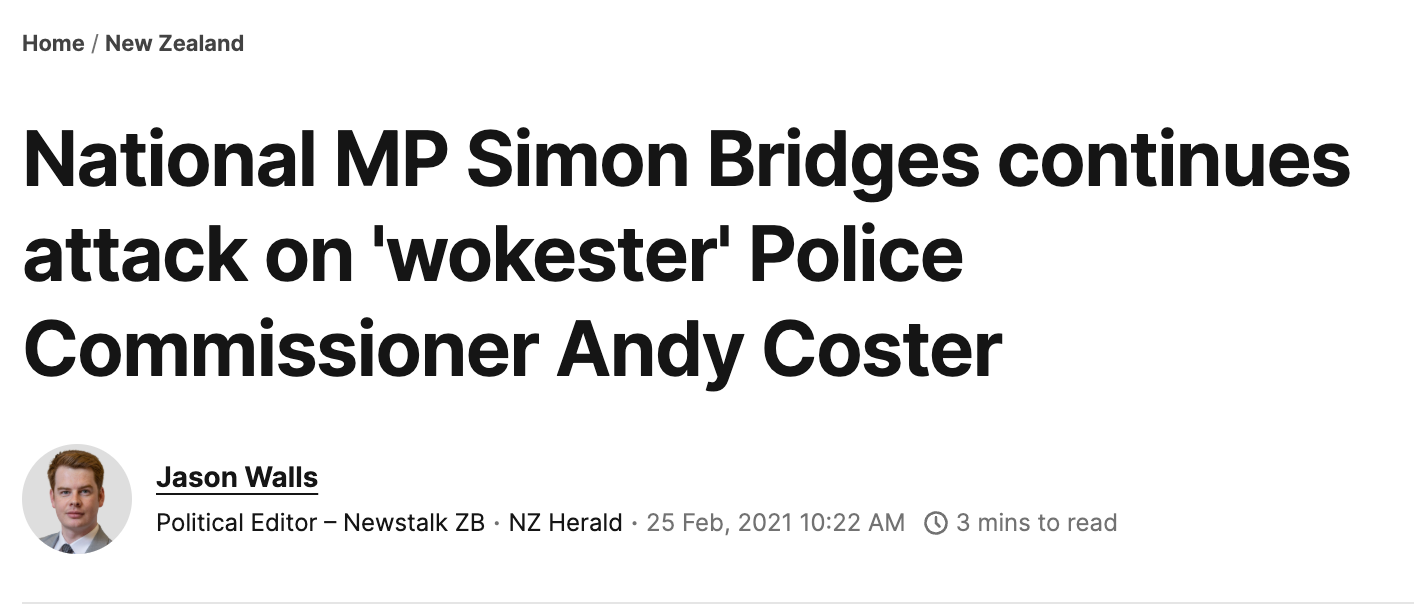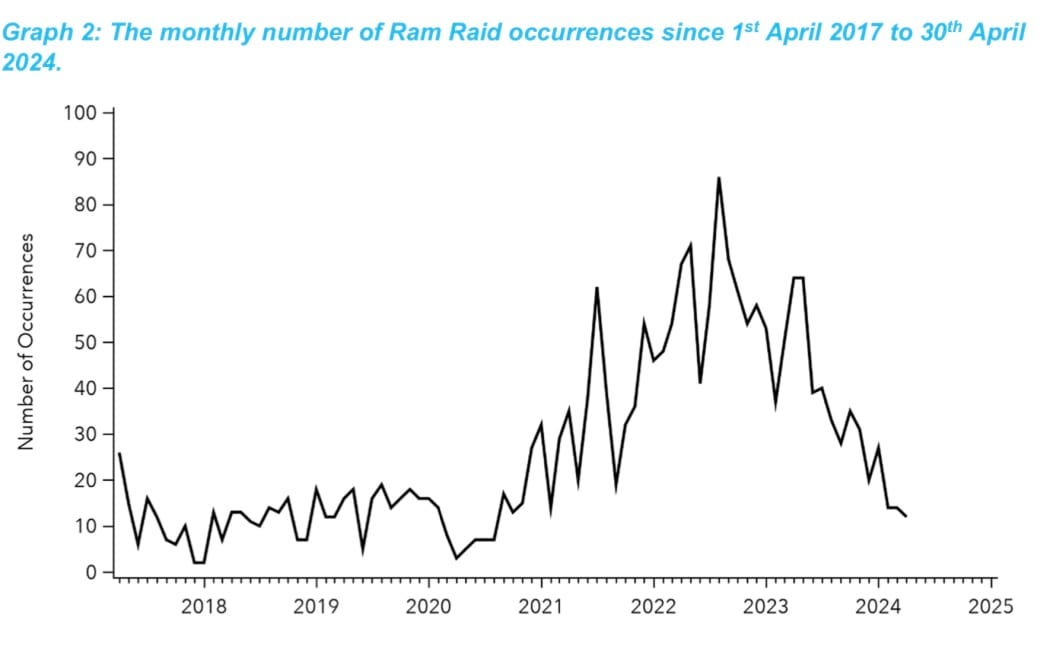Part Three: What the McSkimming scandal means for politics in New Zealand
When corruption takes root in our institutions, it doesn’t stay contained. It spreads quietly, politically, sometimes strategically, and sometimes like a weed growing uncontrolled and putting down roots. The scandal now engulfing the Police isn’t just about bad cops or weak leadership. It’s about the decisions, alliances, and cowardice that allowed that culture to fester for years right under the noses of ministers, journalists, and senior bureaucrats who should have stopped it.
Andrew Coster’s rise was not inevitable. It was engineered. Or at least it got a massive helping hand. When Jacinda Ardern appointed him Police Commissioner in 2020, there was audible surprise; even within the force. Of the shortlist, Coster was the least experienced and certainly not the odds on favourite for the top job. “He had not been considered a frontrunner for the top job,” reported RNZ. Yet he fit the government’s ideological template of a polished, progressive performer who was unlikely to rock the boat.
Coster was likely to continue to toe the increasingly politicised line that Ardern had drawn with Police Commissioner Mike Bush with many questioning how much she was leaning on him to get involved in politics. For example, in early 2018 rumours began circulating widely on social media and in certain political and business circles that Clarke Gayford, partner of Jacinda Ardern, was under police investigation. It spilled into the mainstream news cycle; though most outlets refused to publish the rumour’s substance due to receiving a letter from Clark Gayford via his lawyer Linda Clark (who would later represent McSkimming) putting them “on notice” that the rumours were defamatory and “any publication of the substance of the allegations… will result in proceedings being filed immediately”.1
The most unusual part of this saga was that the Police dropped their usual silence on speculation and rumours and waded in to take pressure off Ardern’s partner. They issued a public statement confirming that Gayford “is not and has not been the subject of any police inquiry, nor has he been charged in relation to any matter.”2 Police typically do not comment publicly on whether individuals are or are not under investigation and from a political-institutional perspective, the episode raised serious issues of perception and trust.
The motivations for the Police to clear Gayford are unlikely to have been for the good of the New Zealand Police as an institution nor for public order. The only benefit to them becoming involved was to Gayford, Ardern, Labour, and their Government. It signals that a key state agency was responding not purely to policing imperatives, but to political noise and potential political pressure. That conflation of policing with political damage-control undermined the apolitical independence the public should be able to expect of the Police. When the Commissioner looks like he’s running cover for the Prime Minister’s partner, public trust takes a hit.
The Gayford saga matters because it illustrates how state-institutions, in this case, the Police, may become enmeshed in political narrative management rather than purely crime-fighting. When the Commissioner or top leadership feel compelled to respond to rumour about the partner of the Prime Minister, rather than to definable crime matters, the line between law-enforcement and politics blurs. Public trust in the neutrality and integrity of the institution suffers. The rot, therefore, had begun not just “inside the police” but at the intersection of police, politics and public narrative.
Once in the top job, “policing by consent” became Andrew Coster’s mantra. It’s a phrase that sounded nice at a Beehive podium but translated, in practice, to ‘policing by appeasement’. Ardern and her cabinet saw in Coster a commissioner who would soften the edges of enforcement and carry the image of the kinder, gentler state they envisaged. The problem was that criminals didn’t get the memo that they were supposed to respond to leniency with an emphatic halt to committing crime. What we got instead was a Police hierarchy paralysed by public-relations management and allergic to accountability; a perfect incubator for what would later be exposed through the McSkimming scandal.
National sniffed out the weakness early. Simon Bridges famously went to war with Coster in Parliament, calling him a “wokester commissioner” and sneering that he was more interested in hugs than handcuffs. The nickname “Cuddles Coster” stuck, not unfairly. Under his watch, gangs flourished, firearms violence climbed, and the police response to ram-raids became a national joke. Coster’s leadership style might have made sense in a social-work agency, but he was running the country’s law enforcement. The Police’s duty isn’t to understand offenders; it’s to stop them. Yet Labour doubled down, defending him as the face of their “modern policing” agenda.
Coster was likely to continue to toe the increasingly politicised line that Ardern had drawn with Police Commissioner Mike Bush with many questioning how much she was leaning on him to get involved in politics. For example, in early 2018 rumours began circulating widely on social media and in certain political and business circles that Clarke Gayford, partner of Jacinda Ardern, was under police investigation. It spilled into the mainstream news cycle; though most outlets refused to publish the rumour’s substance due to receiving a letter from Clark Gayford via his lawyer Linda Clark (who would later represent McSkimming) putting them “on notice” that the rumours were defamatory and “any publication of the substance of the allegations… will result in proceedings being filed immediately”.1
The most unusual part of this saga was that the Police dropped their usual silence on speculation and rumours and waded in to take pressure off Ardern’s partner. They issued a public statement confirming that Gayford “is not and has not been the subject of any police inquiry, nor has he been charged in relation to any matter.”2 Police typically do not comment publicly on whether individuals are or are not under investigation and from a political-institutional perspective, the episode raised serious issues of perception and trust.
The motivations for the Police to clear Gayford are unlikely to have been for the good of the New Zealand Police as an institution nor for public order. The only benefit to them becoming involved was to Gayford, Ardern, Labour, and their Government. It signals that a key state agency was responding not purely to policing imperatives, but to political noise and potential political pressure. That conflation of policing with political damage-control undermined the apolitical independence the public should be able to expect of the Police. When the Commissioner looks like he’s running cover for the Prime Minister’s partner, public trust takes a hit.
The Gayford saga matters because it illustrates how state-institutions, in this case, the Police, may become enmeshed in political narrative management rather than purely crime-fighting. When the Commissioner or top leadership feel compelled to respond to rumour about the partner of the Prime Minister, rather than to definable crime matters, the line between law-enforcement and politics blurs. Public trust in the neutrality and integrity of the institution suffers. The rot, therefore, had begun not just “inside the police” but at the intersection of police, politics and public narrative.
Once in the top job, “policing by consent” became Andrew Coster’s mantra. It’s a phrase that sounded nice at a Beehive podium but translated, in practice, to ‘policing by appeasement’. Ardern and her cabinet saw in Coster a commissioner who would soften the edges of enforcement and carry the image of the kinder, gentler state they envisaged. The problem was that criminals didn’t get the memo that they were supposed to respond to leniency with an emphatic halt to committing crime. What we got instead was a Police hierarchy paralysed by public-relations management and allergic to accountability; a perfect incubator for what would later be exposed through the McSkimming scandal.
National sniffed out the weakness early. Simon Bridges famously went to war with Coster in Parliament, calling him a “wokester commissioner” and sneering that he was more interested in hugs than handcuffs. The nickname “Cuddles Coster” stuck, not unfairly. Under his watch, gangs flourished, firearms violence climbed, and the police response to ram-raids became a national joke. Coster’s leadership style might have made sense in a social-work agency, but he was running the country’s law enforcement. The Police’s duty isn’t to understand offenders; it’s to stop them. Yet Labour doubled down, defending him as the face of their “modern policing” agenda.

Under Labour and Commissioner Andrew Coster, New Zealand’s law-and-order landscape drifted from deterrence to indulgence and the results spoke for themselves. Between 2017 and 2023, Labour’s self-congratulatory rhetoric about “reducing the prison population” became a de facto policy of emptying prisons regardless of consequence. In 2017, the prison population was around 10,500. By mid-2023 it had dropped below 8,000 and this wasn’t because people stopped doing crimes. This was a decline the government touted as progress, even as violent crime surged and retail workers were being terrorised daily. The ideological goal was to show a more “compassionate” justice system; the reality was streets full of repeat offenders and victims who felt abandoned by the state that was supposed to protect them.
Coster’s leadership fitted this approach perfectly. His “policing by consent” was a model that prioritised communication and understanding over enforcement. In theory, it sounded modern and humane. In practice, it meant officers were told to negotiate with gang members instead of arresting them, to “de-escalate” instead of intervene, and to tolerate growing lawlessness in the name of community relationships. Frontline police became demoralised. Shopkeepers were left on their own. Ordinary New Zealanders stopped bothering to report crime because they knew nothing would happen.
Under Labour, “soft on crime” became not just an accusation but an observable condition. Ram-raids, carjackings, and violent youth offending exploded, while the government’s priority seemed to be re-branding the police as social workers with tasers. The justice system tilted toward the offender at every level with fewer prosecutions, lighter sentences, and endless second chances. When Coster appeared before Parliament to discuss the crime wave, he spoke not of deterrence but of “trust-building.” That was the problem, the government wanted the public to trust them while failing to give them a reason to.
The experiment in moral vanity failed. The prisons were emptied and so the streets were filled. Communities that needed protection most were left to fend for themselves. Labour’s criminal-justice legacy, and Coster’s tenure, will be remembered as a case study in how ideological softness masquerading as compassion can rot the foundations of law and order.
Coster’s handling of the 2022 Parliament protest cemented his image. For weeks, Wellington descended into chaos while he stood back and talked about “de-escalation” before coming in suddenly heavy-handed. Businesses and residents lives were interrupted, police morale cratered, and a disenchanted, distrusting section of the public grew to hate the police. When the inevitable crackdown finally came, it was brutal and chaotic. It was the worst of both worlds: weak leadership followed by overcorrection. It was clear by then that Coster’s “consent-based” policing was really indecision-based policing.

Click to view
Then there’s the unanswered questions of what really happened around Kiri Allan’s arrest. Allan’s crash, her refusal to accompany officers, a very delayed evidentiary blood alcohol test and the heavily redacted OIAs and communication between Police and the Labour Government all reeked of political management rather than routine enforcement. Coster was called by a senior sergeant and he contacted Minister for Police Ginny Andersen citing the “no surprises” policy. He then briefed her over the over phone about the incident. She contacted Prime Minister Chris Hipkins.

Click to view
Aside from being extraordinary behaviour from a minister of the Crown, what was strange about the situation is that even though at the scene the Minister of Justice’s alcohol breath test showed a reading over 400mcg per litre of breath, “Allan was allowed to meet with her lawyer before taking an evidential breath test, despite police protocol stating the test should be done “without delay”.”3
Given a reading over 400 results in a criminal charge of drink-driving and a reading over 250 leads only to an infringement, the three hour delay in testing Allan at the station is very significant. She eventually returned a result of 335mcg. What would it have been 3 hours earlier? Was this another example of the Police bending to protect political relationships? To what degree were senior officers or the Commissioner himself involved in ensuring there was a delay in the minister taking a test at the station?
It is likely Coster would have been appointed for another term as Police Commissioner under Labour, but when National formed government he would have known he was on borrowed time. His style (soft, bureaucratic, ideologically captured) was incompatible with a coalition that had promised to restore law and order.

Then New Zealand Police Commissioner Andrew Coster speaks to the media on June 19, 2020 in Auckland, New Zealand. (Source: Getty)
The political solution was to move him sideways. The hideous practice, in which the New Zealand public service seem to engage far too often, of failing upwards or sideways. No matter the government, our system seems to always find a golden handshake and a fat pay cheque for its bureaucrats.
Coster’s new job was arguably one to which he was much more suited; Chief Executive of the Social Investment Agency. But now, just over a year into the job he finds himself on leave and under investigation for his role in the McSkimming cover up.
Under new leadership, Police performance has sharply improved. Ram-raids have all but vanished. Youth offending is down, response times are up, and frontline moral, long eroded by years of bureaucratic hand-wringing and “softly-softly” policing, has finally begun to recover. Officers who once felt micromanaged and politically muzzled now speak of having permission to do their jobs again.

For the first time in years, the numbers back the rhetoric. Crime statistics and community feedback both point to a Police force that was regaining its backbone and public trust. The streets feel different not because the problems have magically disappeared, but because the tone from the top has changed.
It’s hard to argue against the notion that removing Coster was the right call. His tenure was defined by hesitancy and optics management, where “de-escalation” became a euphemism for inaction. The turnaround since his departure is a case study in how leadership, in government and police, can transform a demoralised institution almost overnight.
Until, that is, the rot still under the floorboards from Coster’s tenure was uncovered. The trust that was being built block-by-block was obliterated with the breaking news of the IPCA report and the McSkimming cover up. Everything is being questioned. Every slightly odd handling of a situation, like Gayford or Allan’s cases, is now under suspicion. The question being repeated is ‘if they were willing to bend the rules and subvert procedure for McSkimming, what else did they think warranted the same?’
As the McSkimming scandal has unravelled, one fact kept surfacing: Ms Z, the woman at the centre of it all, had been emailing everyone. MPs, ministers, journalists, police, bureaucrats. Dozens of people received her messages. Quite understandably people are asking how nothing was done for so long when so many people knew about it and received emails.
Some grace does need to be given to all recipients of the emails. We know that Ms Z was highly distressed and sending a high volume of emails that weren’t written particularly coherently. Lessons should be learned from this about not judging the importance of correspondence by how ‘sane’ one might perceive it to be, but it is easy to see why the emails might have been dismissed as rantings. Media, politicians, police, and bureaucrats do get a lot of bizarre and conspiratorial correspondence. Staff have to triage. They make judgment calls.
What is alarming however is the reports that suggest Coster himself intervened directly to prevent the Police Minister reading the emails. He is said to have ordered that emails intended for Police Minister Mark Mitchell be diverted straight to his own inbox. Ministers have advisors and secretaries seconded from their ministries to work in their offices as a bridge between the two. Coster instructed the junior staff member who was seconded in Mitchell’s office to divert any emails from Ms Z or about McSkimming to him.
The Department of Internal Affairs has condemned the interference suggesting the allegations are true. The NZ Herald reports:
“It is not appropriate for departments to withhold information from ministerial staff or Ministers,” Department of Internal Affairs chief executive Paul James said.
“We will be reminding agency Chief Executives of this, as well as reminding our staff of existing policies and guidance on dealing with incoming correspondence.”
James said there was no indication other public sector agencies had been given the same instructions.
This is extraordinary behaviour from a Police Commissioner, effectively inserting himself between the elected Minister of Police and the information flow from his own department. It points to a Commissioner who had become far too comfortable operating as a political actor rather than a public servant. Ministers are supposed to be briefed, not managed. The idea that Coster could unilaterally decide which communications the Minister did or didn’t see underscores the culture of control and opacity that festered under his leadership.
This revelation raises serious constitutional questions. The Police Commissioner is meant to be operationally independent, but not politically autonomous. By intercepting or redirecting ministerial correspondence, Coster has blurred that line beyond recognition. It suggests a man desperate to contain the damage, to keep a lid on whatever was unfolding inside Police headquarters. The idea that the country’s top cop was filtering communications to a Cabinet Minister should alarm anyone who values accountability in a democracy.
The emerging narrative that Mitchell and Luxon ignored some “smoking gun” email is absurd, deeply political, and being pushed by the media and Labour. McSkimming was put on leave within a month of Labour appointment Andrew Coster leaving and National appointment Richard Chambers taking over. This was almost exactly a year into this coalition government’s term.
In the first instance this should be viewed as a New Zealand Police problem, but when examining possible political failings we should quite obviously be looking at the government that was in power for six years and appointed both Coster and McSkimming, not the year-old administration having to clean up the mess who made it clear they would not be reappointing Coster.
Hipkins has been slyly trying to make this about who received the emails rather than who enabled a corrupt senior police executive. He is actively trying to absolve himself of any responsibility despite his signature sitting on the Prime Ministerial recommendation for Jevon McSkimming to become statutory Deputy Commissioner.
There is no suggestion that the then-Prime Minister knew about the extent of Ms Z’s distress or the allegations being made by her against McSkimming. However, given the widespread knowledge of McSkimming’s “consensual affair” narrative it is possible he knew this and even just a consensual affair is a risk in senior positions as it presents a blackmail risk. However, given Chris Hipkins met his current partner when she was his intern, his opinion on dating younger staff members might be more permissive than perhaps it should be. He is probably lucky his affair didn’t come out when Jacinda Ardern was Prime Minister as he might have found himself in sacked from ministerial roles like Iain Lees-Galloway. Lees-Galloway’s affair with a staff member had also happened years earlier, but only came to light in 2020.
Meanwhile, the media are pointing fingers while standing knee-deep in hypocrisy. They, too, were getting the same emails. So why didn’t they investigate? Why didn’t even one newsroom pick up the threads? The truth is uncomfortable. Our press corps has become timid, selective, and complicit. They have uncurious journalists who lack the drive of their predecessors. And worst of all, our journalists have lost their anti-establishment instincts that aided them in questioning anything the powerful did. Now they are more likely to publish press releases uncritically and look to the establishment for pats on the head. Especially when the allegations involve their ideological allies. Every media platform should explain why they did not do anything about the emails before they publish stories about anyone else who didn’t.
This is a story about police misconduct, but it also leaves a plethora of political questions. Labour’s legacy is a demoralised police force, a rotten police executive, and a commissioner whose appointment now looks reckless. National’s challenge is managing the clean-up without getting dragged into the muck of who-knew-what-when regarding the McSkimming emails. The media’s credibility is already in tatters, but the fact that they would call out others for not doing anything about the emails when they were literally CC’d is wild.
At its core, the rot exposed by this scandal is not confined to the police. It runs through the political class, the bureaucracy, and the commentariat that props them up. Everyone saw the signs. Everyone stayed quiet.
Andrew Coster’s career is now over in law enforcement, maybe public service altogether, and rightly so. But the consequences of his era, the politicisation of the Police, the corrosion of public trust, the perception that justice bends for the powerful, will linger. This government’s task, and the next government’s too, isn’t just to fix crime statistics; it’s to rebuild the moral architecture of our institutions. Because when rot sets in, it’s not enough to prune, you have to cut deep.
References:
1 https://thespinoff.co.nz/media/02-05-2018/the-grapevine-gazette-how-nz-media-handled-the-clarke-gayford-rumours?
2 https://www.odt.co.nz/news/national/apology-and-payment-clarke-gayford-after-baseless-lies
3 https://www.nzherald.co.nz/nz/kiri-allan-crash-police-file-on-ex-justice-ministers-offending-reveals-new-information-from-the-night/XPKE4MDCTRDE5BTWA35OEQKISY/
Ani O'Brien comes from a digital marketing background, she has been heavily involved in women's rights advocacy and is a founding council member of the Free Speech Union. This article was originally published on Ani's Substack Site and is published here with kind permission.



2 comments:
Ani deserves credit for this comprehensive and reasoned analysis. It should be widely read, taken seriously, and acted upon.
It was "interesting" that when the McSkimming 'saga' gained air time and our MSM became 'very interested', that there was "radio silence" from Ginny Andersen.
But, as of tonight, on TVNZ 6.00 PM News (18.11.25), there she was "expressing contempt" regarding the current Govt's aim to achieve a target of 500 hundred new recruits.
Me thinks, that NZ Police need to 'come clean' over the recent 120 persons, engaged as recruits only to find that most had not and/or failed to meet pre-entry physical testing.
One speculates, which segment of the Community they came from.
Sadly over the past years, we have had instances of Police mis-conduct occurring and one wonders "if they learnt anything from those incidents".
Post a Comment
Thank you for joining the discussion. Breaking Views welcomes respectful contributions that enrich the debate. Please ensure your comments are not defamatory, derogatory or disruptive. We appreciate your cooperation.